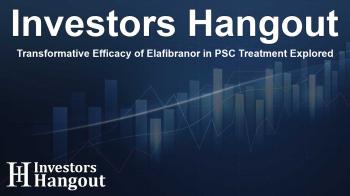Transformative Efficacy of Elafibranor in PSC Treatment Explored

Significant Findings on Elafibranor's Impact on PSC
Elafibranor shows promising results in treating primary sclerosing cholangitis (PSC), a rare liver disease that lacks approved treatment options. Recent data indicates that elafibranor is not only safe but also exhibits dose-dependent efficacy. In a study spanning 12 weeks, patients receiving elafibranor demonstrated noteworthy improvements in liver biochemistry, showcasing the compound's potential to address this critical health challenge.
Key Results from the ELMWOOD Study
The late-breaking data from the ELMWOOD study underscores elafibranor's significant impacts on liver health. Patients treated with elafibranor exhibited a substantial decrease in alkaline phosphatase (ALP), a vital biomarker for liver function. Patients on the 80 mg and 120 mg doses showed reductions of -103.2 U/L and -171.1 U/L, compared to an increase of +32.1 U/L in the placebo group. Improvements became apparent as early as week four, suggesting elafibranor's swift action.
Reducing Symptoms of PSC
Alongside its biochemical efficacy, elafibranor effectively alleviated symptoms of PSC, particularly improving pruritus or itching. In the study, patients receiving 120 mg of elafibranor reported reductions in itch severity as measured by the Worst Itch Numeric Rating Scale, which is a crucial aspect of patient quality of life. Furthermore, stability in non-invasive markers indicative of liver fibrosis was observed among elafibranor recipients, critically enhancing their overall health outlook.
Safety Profile Observations
The safety profile of elafibranor remains robust, with adverse events noted but not escalated when compared to placebo. In terms of treatment adherence, less than 5% of patients on elafibranor discontinued due to side effects, which is favorable compared to the placebo group. Dr. Christelle Huguet of Ipsen highlighted the significance of these findings, reinforcing a commitment to addressing rare liver diseases with effective therapies.
Ongoing Commitment to Research
Experts, including Dr. Cynthia Levy from the University of Miami, emphasized the urgent need for effective treatments for PSC, indicating elafibranor's promising trajectory for further research. The Phase II trial's positive outcomes indicate a strong foundation for potential future studies in larger populations, enabling a comprehensive understanding of elafibranor's efficacy and safety.
Understanding Primary Sclerosing Cholangitis
PSC is a serious condition characterized by chronic inflammation and scarring of the bile ducts. This disease carries a risk of severe complications, including liver damage and failure, with liver transplantation being the only current treatment option significantly improving prognosis. The ongoing research into elafibranor offers a beacon of hope for affected patients, paving the way for innovative therapies in the realm of liver health.
About Ipsen's Research Initiatives
As a prominent biopharmaceutical company, Ipsen is dedicated to exploring innovative treatments across multiple therapeutic areas, including oncology, rare diseases, and neuroscience. With nearly a century of experience in drug development, Ipsen continues to expand its reach, aiming to improve patient outcomes worldwide. Recent advancements such as the accelerated approval of elafibranor for Primary Biliary Cholangitis demonstrate Ipsen's proactive approach in addressing urgent medical needs.
Frequently Asked Questions
What is primary sclerosing cholangitis (PSC)?
PSC is a rare liver disease causing inflammation and scarring of bile ducts, leading to liver damage and potential failure.
What role does elafibranor play in treating PSC?
Elafibranor has shown a favorable safety profile and significant efficacy in improving liver biochemical markers in PSC patients.
What were the primary results of the ELMWOOD study?
Patients treated with elafibranor exhibited significant reductions in alkaline phosphatase levels and marked symptom relief related to PSC.
How does elafibranor compare to placebo?
Elafibranor demonstrated better efficacy and a similar or improved safety profile compared to placebo in the trial findings.
What is the future direction for research on elafibranor?
Further investigations are planned to explore elafibranor's effectiveness across larger patient populations and different liver diseases.
About The Author
Contact Caleb Price privately here. Or send an email with ATTN: Caleb Price as the subject to contact@investorshangout.com.
About Investors Hangout
Investors Hangout is a leading online stock forum for financial discussion and learning, offering a wide range of free tools and resources. It draws in traders of all levels, who exchange market knowledge, investigate trading tactics, and keep an eye on industry developments in real time. Featuring financial articles, stock message boards, quotes, charts, company profiles, and live news updates. Through cooperative learning and a wealth of informational resources, it helps users from novices creating their first portfolios to experts honing their techniques. Join Investors Hangout today: https://investorshangout.com/
The content of this article is based on factual, publicly available information and does not represent legal, financial, or investment advice. Investors Hangout does not offer financial advice, and the author is not a licensed financial advisor. Consult a qualified advisor before making any financial or investment decisions based on this article. This article should not be considered advice to purchase, sell, or hold any securities or other investments. If any of the material provided here is inaccurate, please contact us for corrections.

